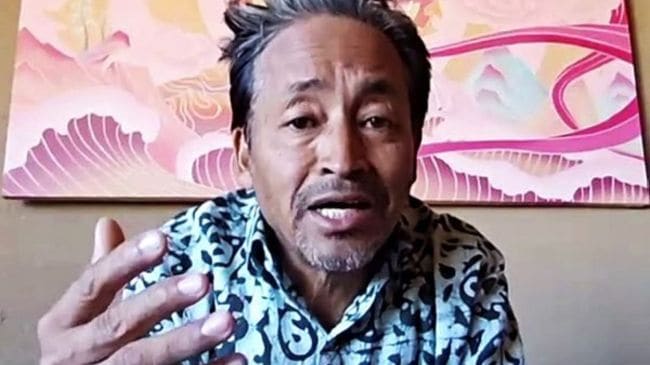Opinion In detaining Sonam Wangchuk, government has forgotten the lessons of history
Leaders who follow the path of non-violence acquire a moral heft – they are seen as above usual political tussles. Government must not make mistake that Congress regimes made with Jayaprakash Narayan and Anna Hazare
 The detention of Gandhian activist Sonam Wangchuk -- just two days after the condemnable violence that led to the death of four protestors and many injuries -- is a move in the wrong direction.
The detention of Gandhian activist Sonam Wangchuk -- just two days after the condemnable violence that led to the death of four protestors and many injuries -- is a move in the wrong direction. Several streams of thought have dominated socio-political movements in precolonial and postcolonial India. Be it M N Roy’s anti-imperialist internationalism, Subhash Chandra Bose’s anti-colonial nationalism, Gopal Krishna Gokhale’s moderate politics, Bal Gangadhar Tilak’s extremism within the Congress fold, B R Ambedkar’s politics based on caste consolidation, or V D Savarkar’s religious nationalism. None, arguably, has withstood the ethical test as resolutely as Gandhian non-violence and Satyagraha. The moral courage to stand against power without resorting to violence is what shaped leaders like Jayaprakash Narayan, who changed the course of Indian democracy.
In India, the arrest of a Gandhian leader – not a self-proclaimed one, but one who follows both Gandhian ethics and method – has almost always backfired. So, the detention of Gandhian activist Sonam Wangchuk — just two days after the condemnable violence that led to the death of four protestors and many injuries — is a move in the wrong direction. Wangchuk also asked protesters and his followers to abjure violence. His detention could cast a shadow over the proposed talks, scheduled for October 6 and deepen the anguish in Ladakh.
Moments after the protests turned violent, demanding statehood and implementation of the Sixth Schedule — Sonam Wangchuk attributed it to the “pent-up anger of the last five years” – the Centre held him responsible for inciting the youth. The next day, it revoked the FCRA licence of the Students’ Educational and Cultural Movement of Ladakh, and the CBI started an inquiry into his Himalayan Institute of Alternatives Ladakh for alleged FCRA violations. In an interview on September 25, Wangchuk said, “Sonam Wangchuk in jail may cause them more problems than a free Sonam Wangchuk.” India’s post-independence history suggests the same.
First, Sonam Wangchuk withdrew his fast – he began it on September 10, demanding fulfilment of their demands – immediately after the violence broke out. Though he didn’t mention the Chauri Chaura incident of February 1922, following which Gandhi suspended the non-cooperation movement, his action clearly indicates his conviction in non-violence. Second, the Ladakhi people’s movement for recognition and constitutional rights never turned violent. Wangchuk’s peaceful march to Delhi during September 2024 – he and other protestors were detained at the Delhi border – echoed the essence of Gandhian marches that shaped the contours of the Indian freedom movement. Notably, Wangchuk and the other Satyagrahis wanted to pay their tribute to Gandhi at Rajghat on his birth anniversary. Third, Sonam Wangchuk’s Satyagraha, be it in Ladakh or Delhi, emphasised sustainable development, which was the essence of Gandhi’s book The Hind Swaraj. Standing against the consumerist greed, Sonam Wangchuk, the environmentalist, underlined the need for exercising restraint.
Against the backdrop of his detention, it’s important to remember what happened the night before the imposition of the Emergency, when Jayaprakash Narayan was arrested from the campus of the Gandhi Peace Foundation. Senior leader K S Radhakrishnan requested the police several times to delay the arrest, because JP was not physically fit. But Indira Gandhi’s police were in no mood to wait. Around 3 am, as they were taking the Gandhian leader to Parliament Street police station, JP, addressing a small crowd, thundered, “Vinaash kale vipareeta buddhi (People lose their minds as they inch closer towards their end).” The rest is history.
Another such moment came on August 15, 2011, when the Gandhian activist and anti-corruption crusader Anna Hazare was arrested by the Congress-led government’s police. Within a few years, Congress was almost decimated across the country.
Gandhian ethos is the foundational essence of contemporary Indian political movements, and the leaders who follow the path of Satyagraha often achieve the stature of a political ascetic — one who is seen as above the tussle for power. Before detaining any Gandhian, the powers that be should take lessons from history. If it is the “land of Buddha and Gandhi,” as PM Modi said in 2022, a Gandhian must be celebrated, not detained.
abhik.bhattacharya@expressindia.com






